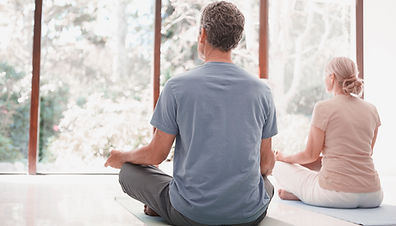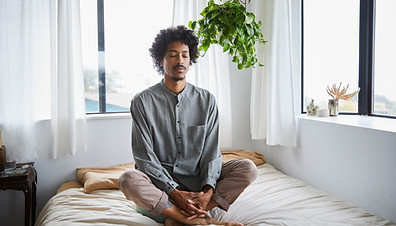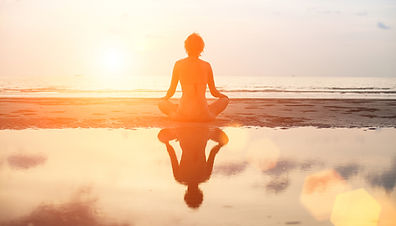
MEDITATE & BREATHE
Meditation can be any practice that helps us to focus our thoughts in a positive way to achieve a calm and stable state of mind

WHY MEDITATE
The word meditate comes from the latin word meditari meaning to think, contemplate, devise or ponder.
Mediation has a huge amount of benefits, from the reduction of our stress and anxiety, to the enhancement of our mood.
Meditation can help us improve our sleep, improve our cognitive skills and lead to better physical and emotional well being.
Mediation also helps us to manage our negative thoughts and emotions and can even be a useful tool to help overcome harmful addictions such as drugs, alcohol or gambling.
Finally meditation can help to increase our attention span, buy increasing the 'strength' and endurance of our attention.

OTHER FORMS OF MEDITATION
There are many other forms of meditation that can help us to focus our thoughts in a positive manner.
Some of the more common are:

MINDFULLNESS MEDITATION
The most common forms of meditation are focused around concentration on our breath. These are known as mindfulness meditations.
To mindfully mediate effectively find a quiet comfortable space where you won't be disturbed.
Start by setting a timer for a short period of time, like 5-10 minutes, which can be increased as you become more comfortable with the practice.
Sitting in a comfortable position with a straight back to keep you alert, focus on your breathing.
Close your eyes and take deep breaths. Pay attention to the sensation of the breath entering and leaving your body.
When your mind wanders, you should acknowledge the thoughts without judgement and then gently return your focus back to your breath.
Practice regularly - consistency is the key to reaping the benefits of meditation.

OTHER FORMS OF MEDIATION CONT'D..
Transcendental Meditation: This technique requires silently repeating a specific mantra to achieve a deep state of relaxation and mental clarity.

Tips for effective Meditation
-
Find a quite comfortable place where you wont be disturbed.
-
Set aside a small amount of time each day.
-
Clear you mind of the clutter by focusing on one specific thing, whether that be your breath, your body or a single thought or thing.
-
When your mind wanders just acknowledge it as thinking and bring yourself gently back to your mediations point of focus.
-
Focusing on what makes you happy and what you are grateful for can enhance feelings of joy, wellbeing and contentment with who we are.
-
Try breathwork techniques to relive anxiety, release stress and help you to relax.
-
Breathwork can also help us in recovering from certain lung conditions.
-
10 minutes a day of mediation and or breathwork, is better than 1 day a year at a retreat. Like anything, consistency is the key to success.

BREATHWORK
Breathwork refers to a variety of breathing techniques we can use to improve our mental, emotional, and physical well-being.
Some of the most popular breathing techniques are:
4-7-8 Breathing: Inhale for four seconds, hold the breath for seven seconds, and exhale for eight seconds. This technique is particularly useful for relaxation and sleep.

MEDITATE
focus

BREATHWORK CONT'D...
Pursed Lip Breathing: this technique involves breathing in through your nostrils for a count of two, then exhaling slowly through puckered lips for a count of four. This method is very useful for people with lung conditions leading to shortness of breath.
Resonance breathing (coherent breathing): This method involves equal inhalation and exhalation or breaths per minute. It is proven to improve oxygen supply and reduce stress response.
Alternate-nostril breathing: Involves inhaling slowly through one nostril at a time while closing the other nostril manually.
Lion's breath: involves inhaling slowly through your nose. Hold the air in your lungs, open your jaw wide and stick your tongue out towards your chin. Then exhale forcefully making a "ha" sound from your abdomen.
